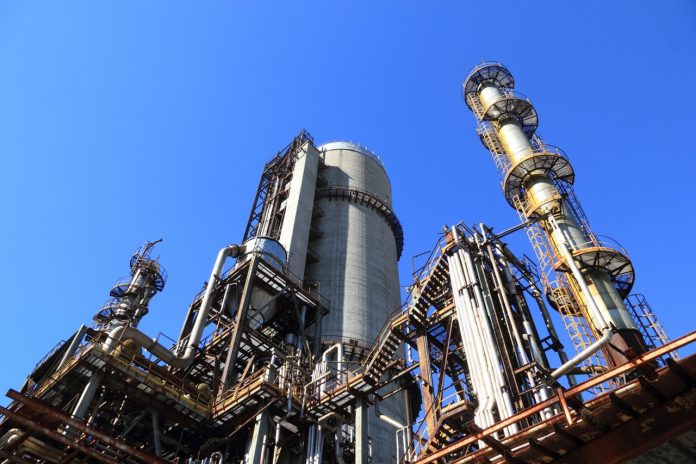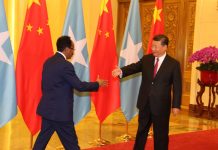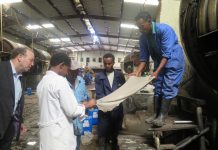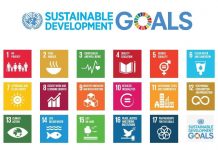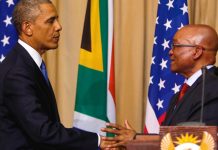U.S. investment is required to build African purchasing power. Right now we’re relying on the Chinese to increase our exports by expanding African economies. We need U.S. investors there not only for export purposes, but also for geo-strategic purposes.
One way to get more investors in there is to conclude treaties that facilitate investment. These include BITS (bilateral investment treaties) and DTTs (double tax treaties), also known as DTAs (double tax agreements). I believe exports can be expanded by sales to U.S. investors in Africa.
If you want to purchase goods, you need money. Right now, the U.S. has cornered sub-Saharan Africa, economically speaking. We want to sell high-value goods – planes, machinery, vehicles – and Ex-Im has a major role here. We’re not attempting to have them build any of these machinery, vehicles, or planes or what have you. We want to sell them to Africa.
Well then they have to sell something to us. Unfortunately, for those who follow the political economist [Walt Whitman} Rostow, normally you’d sell agriculture and build your way up. Rural Africa doesn’t sell us much in terms of agriculture. We want to sell subsidized corn, subsidized wheat, etc., to Africa, so we’re cutting them out of that market.
At the same time China, is selling very cheap products, manufactured goods, etc., that we’re also buying. So we’re buying stuff from China, which then gives China money to invest in Africa. There are many cases where, for example factories in Nigeria, have closed down because of cheaper Chinese goods.
How much cheaper could it be than Africa to produce goods. The big problem is, they don’t have reliable power, reliable roads, etc. The poor infrastructure is precluding African industrialization. What does this leave for competitive advantage? It leaves sub-Saharan Africa with abundant natural resources – oil, timber, etc. – which is basically what we’re seeing.
If you look at what their non-oil sales are to the U.S., it’s minimal, so they don’t have a lot of earning potential to get dollars to buy our goods. Ninety-one percent of AGOA imports are oil, and that goes to Nigeria and Angola. These are countries that are not exactly known for clean oil-revenue sharing, etc. And so the face of AGOA today is not the face of a Lesotho textile worker; it’s a Nigerian oil official, or what have you, driving his Maserati to his London club.
Non-oil AGOA imports are about twice what we spend getting tattoos in this country. It’s quite minimal. The apparel imports which we’ve been fighting about for years and discussing in poor pieces of legislation – that’s our sales of over-the-counter tooth whiteners. As for U.S. food imports, we buy twice as much in Twinkies, and we spend less on U.S. imports than we do on Halloween costumes for our pets.
That’s sad. Sub-Saharan Africa needs a better job. You don’t sell Cadillacs to an 18-year-old intern, you want to sell it to a CEO. You have to give Africa a chance to get the promotions up the ladder.
We built Taiwan and we built the People’s Republic of China by industrializing them. We sent much of our industrial base to Shanghai, to Guangzhou, without concern about labor, without concern about environment, political issues, repression, free speech – we didn’t care about any of that. And we did this with Taiwan also when it was not quite as democratic as it is today. And now they’re importing U.S. goods at an absolutely vast rate.
Our total trade with Africa is now less than one-third of our trade deficit with the People’s Republic of China. If the Africans were able to import at the same rate as the industrialized Taiwanese, we would be exporting I think $988 billion a year to the Africans. There’s no way around it. We need to industrialize Africa.
Sub-Saharan Africa can industrialize – it should industrialize. They need to build an internal market, not just marginal export facilities on the East Asian model that AGOA puts forth. If they industrialize and build their economies they will afford more US goods.
U.S. investors can do this but frankly the US government – I wouldn’t count Exim among this, but certainly the agencies, for example State, USAID certainly – I believe are at best ambivalent about increasing private U.S. investment in sub-Saharan Africa. The aid model is preferred and this helps folks in Arlington Virginia, etc., but it’s not helping Africa.
The terrible thing about this model – our current trading relationship with Africa which, again, outside of oil, is non-existent, economically speaking – is that we’re relying on China to build the market for U.S. goods. Because we’ll buy their goods under AGOA, but we’re not really helping U.S. investors to go in there to make AGOA exports possible.
I’ve never seen a connection being made, even on official U.S. sites, between AGOA, exports to the U.S., and helping U.S. investors build the factories that will provide AGOA exports. There’s very little connection between investment and trade in U.S. government circles.
How do we expect AGOA goods to get to the U.S.? By Chinese-built roads? Professor Nkubi noted that at least 40 percent of all infrastructure projects in Africa are Chinese. I think that’s actually an understatement because China is rapidly moving to capture that entire market. When people think African infrastructure they think China. So it’s going to be growing and growing, especially as they get better used to Africa.
So we want Chinese-built ports, Chinese-built roads, and then maybe we’ll buy AGOA products.
We’re buying goods from the PRC, which we helped to industrialize, and they’re turning around and using that money to invest in Africa, threatening our strategic position on the continent. At the same time they’re creating brand loyalties and they’re also planting investor colonies. Tens of thousands of central province Chinese are now moving to Africa. Not all are going to go home. In the future you’re going to see a great number of folks who marry locally and build a commercial empire in Africa.
We need to turn Africa into mature markets for U.S. goods. We need to treat Africans as “most favored investment partners,” like the PRC. We cannot ask Africa and Africa alone to earn U.S. partnership. In other words, “you clean up corruption and we’ll show up.”
When we look at what we’ve done with China: forced abortions, no free speech repressive communists, strategic rival in Asia. No problem. Here’s our investor list.
But with Africa we say we will not deal with you guys, or maybe we’ll give you a TIFA (trade and investment framework agreement) unless you clean your act up. We need to have at least 10,000 U.S. investors on the continent. It’s quite achievable if there is a will to do it.
We need to conclude treaties that facilitate investment and we need to make it easy for U.S. investors to import U.S.-made capital goods. Whether it fits under the EXIM model or it conceptually could be made to, it should be done.
A BIT is a bilateral investment treaty. It legally protects each state’s investors. It defines what an “investment” is for legal purposes. More importantly, it allows for arbitration. OPIC requires BIT protections to get insurance. If you don’t have a BIT, which the U.S. barely does, you have to negotiate [insurance] yourself, which puts a vast burden on the investor. When you don’t have a BIT, you don’t have protection against expropriation, your risk profile goes to total loss essentially. OPIC requires BIT-type protections for insurance. It’s expensive to negotiate it. If you’re an SME, you don’t have the resources and you just don’t invest. That’s an issue.
The U.S. has almost no BITS with sub-Saharan Africa and they’re all with non-English-speaking countries, except for Cameroon. The rest are French or Portuguese – not the major U.S. target economies: not Ghana, not Nigeria, not Kenya, Namibia, Botswana, etc. You have no protections. And if you go over and you have troubles, you can either hope the U.S. Embassy helps, or if you pay a bribe, the U.S. will happily prosecute you. I’m all for the Foreign Corrupt Practices Act, but at least give our investors the protection they need.
The Arab/Mediterranean Rim has 60 percent coverage of bilateral investment treaties and double tax treaties. Black Africa/Sub-Saharan Africa has 11 percent. That’s a very bad disparity. I’ll let people draw their own conclusions as to motives. As to where we stand against our competitors, our European competitors are well ahead of us, which lowers their investors’ costs, etc. China is well ahead of us.
Tax treaties – this is an important thing. These tend to be bilateral. They divide the taxes and make tax compliance easier and make the burden less; they make sure your margins are protected from a second round of tax. If you do not have a tax treaty, obviously your profit margin goes through the floor.
If a country gives you a tax break, like waives corporate tax, the U.S. Treasury will still tax that windfall. If Ghana gives a corporate tax break, the U.S. will say ‘thank you, but we’ll tax that.’ Why should the U.S. government be eating Ghana’s lunch? If Ghana is poor and won’t eat, why should the U.S. come to the table?
Multinationals can pay for [the services of] Pricewaterhouse and all that, but SMEs cannot and so they don’t invest. The U.S. has one double tax treaty, with South Africa. So if you go to Nigeria, Ghana, Botswana, etc., your margins are going to be double taxed.
The Arab/Mediterranean Rim has 60 percent coverage; Black Africa, 2 percent coverage.
This puts us at a severe disadvantage. The competitors – if you’re in the UK, France, China, etc. – have more legal protection. That means higher risks, higher costs, less funding options for U.S. projects; smaller U.S. presence; bad strategic position; and decline and disappearance from the continent.
The terrible thing is, it is this lack of business interest which is causing our approach by which U.S. government non-intervention, disinterest, is used as a reason not to provide further U.S. government protections because there’s no business interest that the U.S. government created. You have a vicious cycle.
Selling to U.S. investors is a way to bring U.S. exports to Africa. They can be major consumers. If U.S. investors are familiar with U.S. brands then they can use them in projects, just as the Chinese do. There’s no reason we shouldn’t be doing it with our own folks.
If you have this financing help, you can have trade that is commerce within the U.S. system because you’ll have a U.S. seller and a U.S. buyer. It would create an extension of the U.S. market, except that we’d be classifying these sales as exports rather than domestic consumption.
Meanwhile, export financing will help reduce risks and costs and you’ll wildly expand the pool of buyers. Right now, we’re essentially trying to sell to governments, which are aid-aided governments, to buy the waste energy plants and coal plants. What if we can do this with U.S. private purchases? If you have a default, you have much better recourse because you have U.S. parties involved, not just the government.
Moreover, the investor could use those capital goods to build sub-Saharan Africa economies, which would then give them the ability to rise up the ladder and afford more U.S. products, just as we’ve done with the PRC.
Peter C. Hansen Esq. is principal counsel at the Law Offices of Peter C. Hansen, Washington, D.C., and a specialist in African investment law. The above remarks were made at a public meeting of the sub-Saharan Africa Advisory Committee of the United States Export-Import Bank on May 15, 2013.


